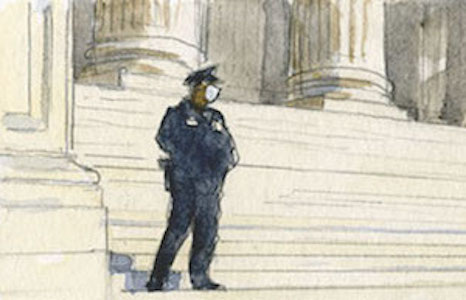Tuesday round-up

on Jul 7, 2020 at 6:40 am

Yesterday the court decided unanimously in Chiafalo v. Washington and Colorado Department of State v. Baca that state laws that penalize or remove presidential electors who do not vote for candidate they pledged to support do not violate the Constitution. Amy Howe has this blog’s opinion analysis, which first appeared at Howe on the Court. Nina Totenberg reports at NPR that the decision “is so strong that it would seem to allow states to remove faithless electors even without a state law.” At Fox News, Tyler Olson and Shannon Bream report that “[m]embers of both parties feared that if the Supreme Court did not issue a ruling on the faithless electors issue, a close election in 2020 could see just a handful of electors move to sway the result.” At Education Week’s School Law Blog, Mark Walsh talks to one of the electors, Micheal Baca, who “hopes that even with the defeat for faithless electors, a larger debate over the Electoral College will gain new momentum.” Additional coverage comes from Brent Kendall and Jess Bravin for The Wall Street Journal (subscription required) and Kevin Daley at The Washington Free Beacon. Derek Muller unpacks the decision at Excess of Democracy. At the Election Law Blog, Rick Hasen writes that “a contrary decision … could have led to great chaos.” At PrawfsBlawg, Gerard Magliocca and Howard Wasserman debate the use of pop culture references in the decision, here and here. Additional commentary comes from Ciara Torres-Spelliscy at the Brennan Center for Justice.
The court also decided in Barr v. American Association of Political Consultants, that an exception for government-debt-collection calls to a federal ban on robocalls to cellphones violated the First Amendment, but left the ban in place without the exception. For The Wall Street Journal, Jess Bravin reports that the justices disagreed about “the rationale for invalidating the debt-collecting exception[:] While seven justices ultimately agreed to strike it down, they divided over the best way to resolve a constitutional challenge to the robocall law.” Greg Stohr reports at Bloomberg that “[t]he ruling is a defeat for political groups that had sought a new avenue for campaign activity in the months leading up to the November election.” At the Constitutional Law Prof Blog, Ruthann Robson writes that because “there is no majority opinion and the opinions demonstrate a perhaps needless fragmentation of the Justices and complication of precedent,” although “the outcome is clear, its ultimate basis is muddied.” Additional commentary comes from Howard Wasserman at PrawfsBlawg, here and here.
Briefly:
- In an op-ed at The Hill, Lawrence Friedman suggests that “[a] closer look at those recent decisions of [Chief Justice John] Roberts that have disappointed conservatives reveals that none is likely to be the last word on the subject.”
- At Lawfare, Jed Shugerman asserts that “a deep dive on the first Congress and the true “’Decision of 1789,’” a series of votes during the drafting of the Constitution on which Roberts relied in ruling “in Seila Law v. Consumer Financial Protection Bureau that the structure of the CFPB was unconstitutional as an independent agency, because Congress required the president to have good cause to remove its single director,” provides “a cautionary tale about originalism and lawyers’ use of history.”
- In an op-ed at the Chicago Daily Law Bulletin, Daniel Cotter recaps last week’s Supreme Court decisions.
- At Empirical SCOTUS, Adam Feldman examines “the justices’ deference to precedent, when they choose to defer, and when they choose not to do so” by looking at “cases where the Court clearly reviewed past decisions since Chief Justice Roberts was appointed to the Court in 2005.”
We rely on our readers to send us links for our round-up. If you have or know of a recent (published in the last two or three days) article, post, podcast or op-ed relating to the Supreme Court that you’d like us to consider for inclusion in the round-up, please send it to roundup [at] scotusblog.com. Thank you!


